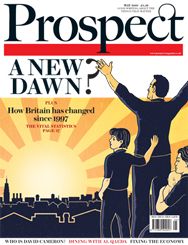It has been a good few weeks for British politics. So thrillingly unpredictable has the election become that by the time you read this the Lib Dem surge may have subsided and the Tories may be cruising to a comfortable victory. Yet I doubt it. The minor innovation of formal television debates between the party leaders has released a force that is turning what was meant to be an anti-political election into something potentially historic. The debates themselves—polite, well informed, rather technocratic—have (so far) been a credit to the political system. The resulting Lib Dem advance could be enough to ensure a minority or even coalition government; and then an overhaul of the whole system to reflect better the preferences of a more restless, less tribal electorate. My own preference is for a Lib-Lab coalition which could move swiftly to agree a deficit reduction and financial reform package, with the invaluable underpinning of 50 per cent plus of the popular vote. But a Tory-Lib coalition would also represent an advance on a solo Tory government. The Tory modernisers have some attractive ideas, yet appear to be a thin layer at the top of the party. And, as Wendell Steavenson discovers in her portrait of David Cameron, the whole remains tantalisingly less than the sum of the parts.
One of the least probable outcomes is a fourth-term Labour government, making this a good moment to look back on the new Labour era (1997-2010). We have done so in numbers and graphs. Many of the findings are familiar: we are richer and better looked after by a bigger welfare state, but more rootless and less socially generous. Reading between the lines, though, there are more surprising conclusions: the average citizen is more tech-literate but the economy has in many ways become lower-tech—we spend less on R&D, while mass immigration has given a relative boost to labour-intensive businesses. (This is not a good base for the “rebalancing” of the economy that Will Hutton discusses.) The decline of manufacturing, and the further hollowing out of the middle income, middle status jobs that results, has continued faster than in the 1980s and 1990s. This continued weakening of old “corporate” Britain with its trade unions and chambers of commerce seems to be what both Phillip Blond and Maurice Glasman are complaining about in their blue Labour/red Tory debate about the alleged withering of civil society. But do we want to go back to the union-dominated 1970s? Surely if we can reinvent our politics we can also renew civil society—without bringing back Arthur Scargill. Indeed, London Citizens—an organisation Glasman speaks up for—seems to be a good example of that renewal.
Introducing Prospect's election issue
April 29, 2010

Prospect's election special












